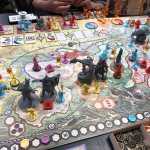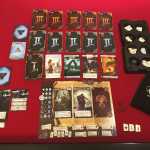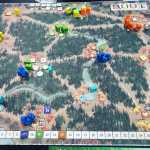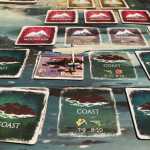Review: Rising Sun

The land of area control games is rich and plenty - there are many, many games in this genre, all trying to capture your attention. Few stand out, and even fewer leave you thinking about them after you play a game. Rising Sun, in its purest form, tries to be one of those games. "But wait!", you say. "How? It looks just like a overpriced miniature game!" Let us remind ourselves that underneath the beautiful exterior can lie fortuitous depth, as the lotus reveals.
Rising Sun is at its heart an area control war game, made up of three rounds (seasons) in which players will rotate who picks the action (mandate) that is taken in a series of 7 turns. These mandates will be a mix of moving, recruiting, training, and more, and will dictate the flow and style of the game. Each player is generally seeking to gain the most points, yet still squeak out enough victories in different places (provinces) on the board to gain the end-game bonuses.
Front and center, however, is the absolutely gorgeous art that nestles itself right into the theme - various clans competing in a mythological feudal Japan. The minis stand out - immediately you are struck by just how detailed the figures are. It really is an impressive sight.
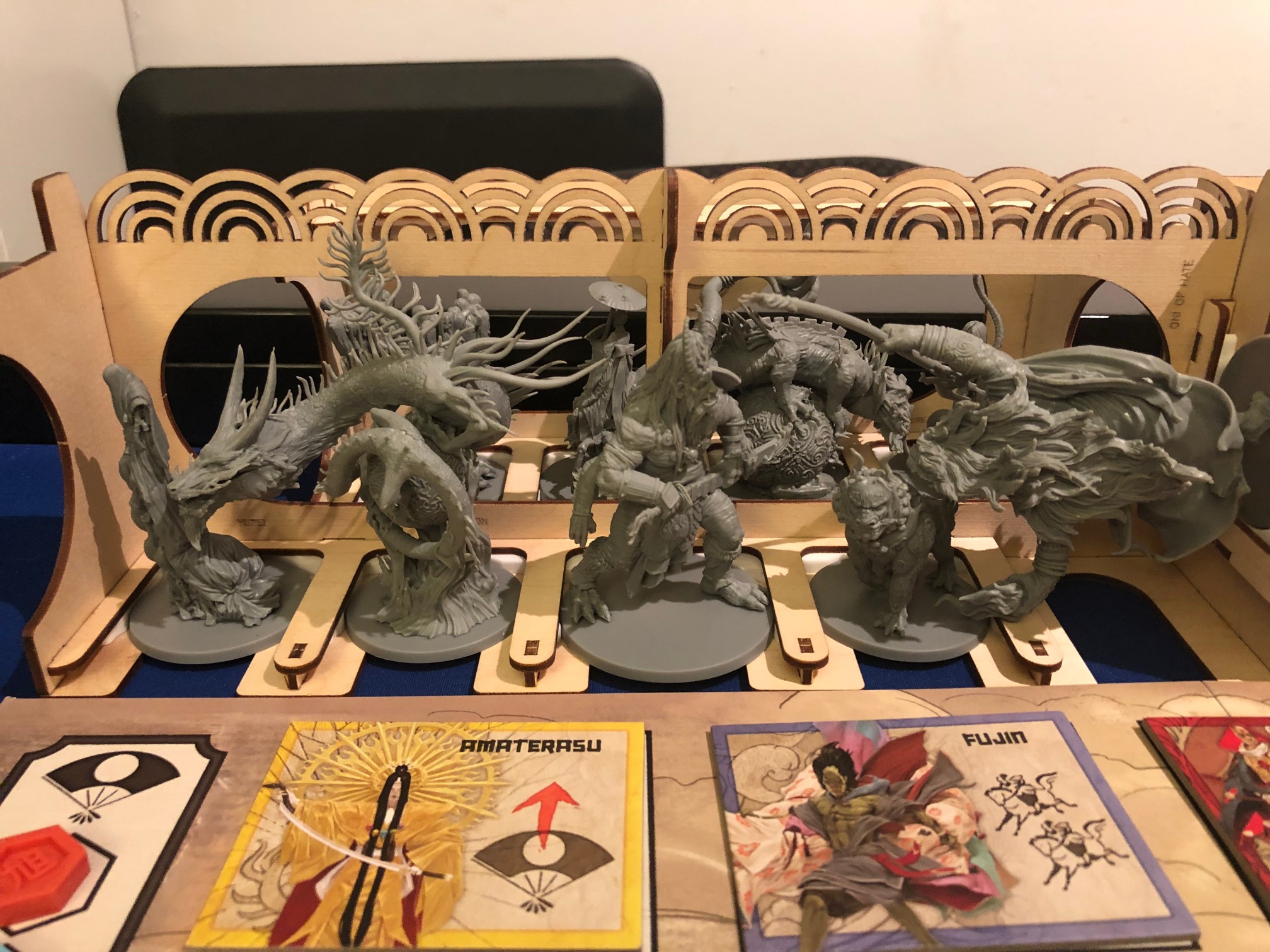
Gameplay
Once players have chosen a clan, the game begins with everyone collecting their income (clans have different rates), and then the Tea Ceremony begins. This is one of the main key decision elements of the game: each season, you can decide whether or not you want to ally with another player or not. Allies will get secondary benefits when their ally chooses a mandate, and avoid deaths in battles.
This leaves the choice of allegiances as a game-swinger, and in a balanced table can keep runaway victories from occurring as a point leader finds themselves unable to find a pair. However, it can lead to runaway 1-2 victories if allegiances fall in a certain way, and the other few players are unable to mount a sufficient challenge. This can especially occur in 4-player games where one side is simply unable to compete with a successful alliance - the only counter is to try and convince the weaker member of the dominant team that they truly are in a one-sided relationship.
From there, players will choose political mandates, which effectively determines what each player at the table will do that round. The acting player (and allies of them if any), get an extra bonus.
- - Recruit allows players to place a figure at each stronghold you own (you start with one), with allies getting an additional figure.
- - Marshal moves any or all of your units a space. Allies can build a stronghold anywhere for 3 coins.
- - Train lets players buy a card from the market, with a discount to the acting team.
- - Harvest gives everyone a coin, but the acting team also gets the board bonuses for any provinces they control
- - Betray breaks your alliance, and allows you to swap out two figures from two different players with two equal figures of your own
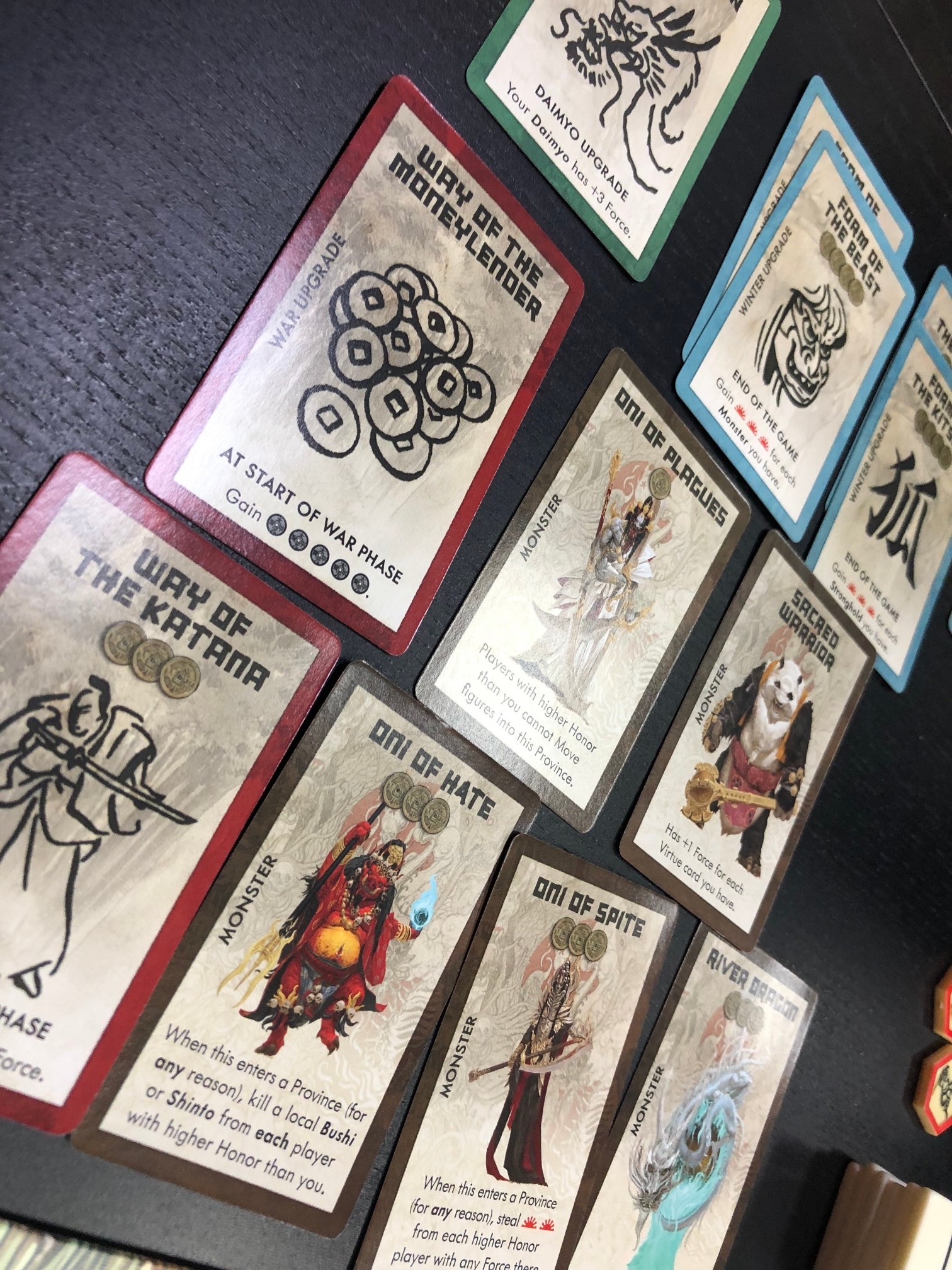
These actions make up the main thrust of the game, and have a supremely interesting element - you only get to choose what happens when you're up first. In a five player game, for example, you're most likely only choosing one of these mandates a season, while two other players will get to choose twice. That makes allying with one of those two a "very important thing to do", as in that partnership you'll have more of a chance on getting the mandates you want for your strategy. Otherwise, you might find yourself out of luck as the mandates just don't fall in the order you need them to.
These actions will largely dictate the game flow, as it will determine how the game eventually resolves. Train-heavy games will have lots of monsters and upgrades on the board; ones that are marshalling and recruiting a lot will inevitably be war-weary. Harvests are simple, yet ingenious point-getting opportunities that can make timing of essential importance: sometimes, paying a neighbor a few coins just to harvest exactly when you want is absolutely worth it. A betrayal done right can swing an entire season toward a player.
It's this flow that gives Rising Sun its unique experience - unlike most wargames which rely on faction differences and tactical positioning to dictate the result, Rising Sun's game within the game in mandate choices makes a session in feudal Japan like no other games.
Three times in the political phase, there will be Kami turns - players with the most units at each of the Kami shrines (four spots at the top) will get those benefits. Players can send Shinto (of which they have 3) to there when recruiting, but that means they're not placing units for battles on the board. Like most things in Rising Sun, it will be a strategic calculation one will have to make whether or not to focus much on Kami. Ties in these spots are broken by the higher on the honor track. What is honor? Basically, the overarching tiebreaker for the game - all ties are given to the higher honor player. This makes it seem like honor is something you always should be striving for, but no! Some cards benefit specifically low-honor players, and the nuance given from this makes the game rich and balanced in play.
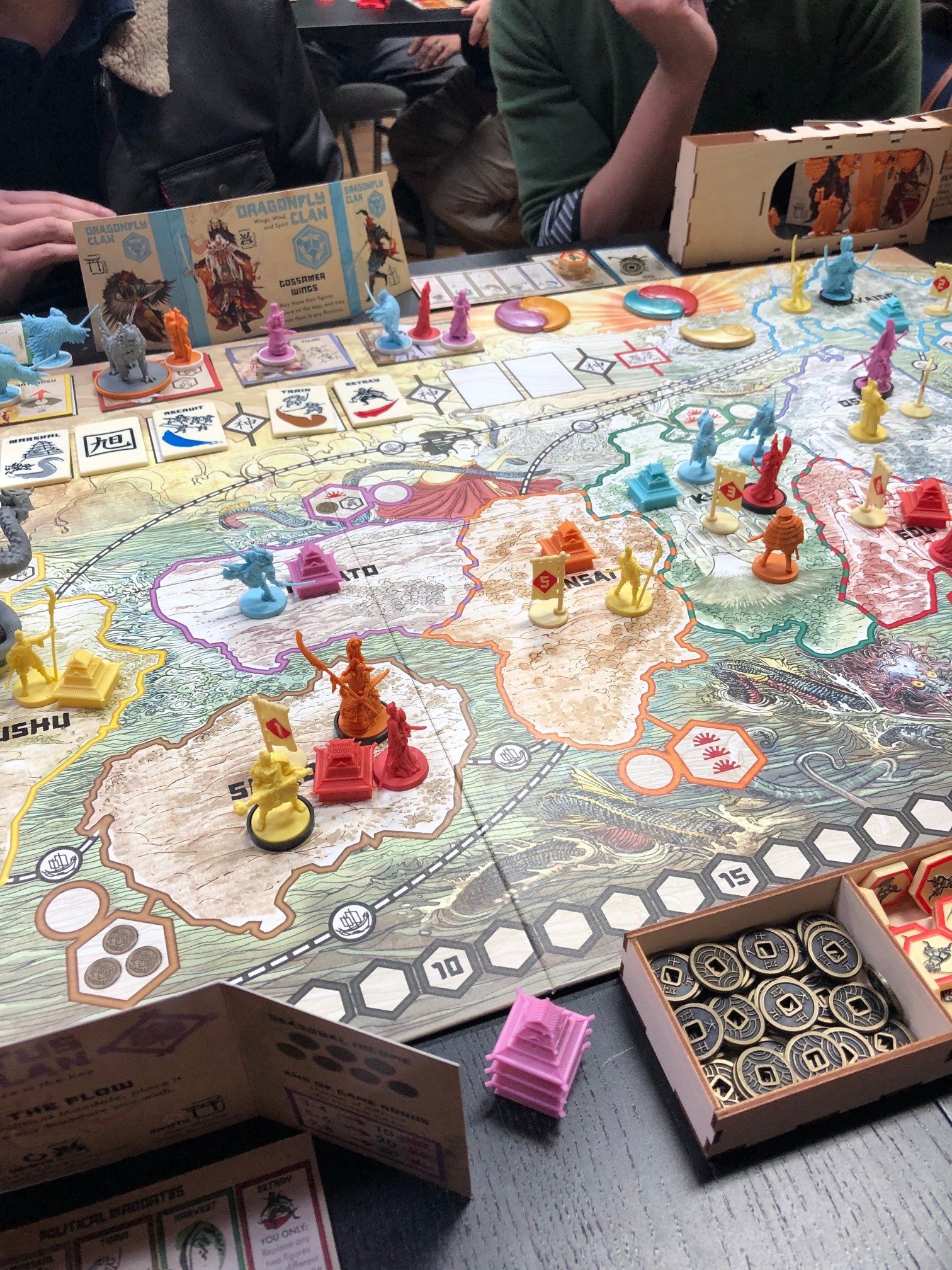
War Phase
After the political phase is over, players turn toward resolving battles in the various provinces. Battles only take place during this phase - cohabitation in provinces has no effect until war begins. At the beginning of a round, war province tokens are drawn which show which provinces battles will take place in. This means not every territory is valuable in a season. Points are also accumulated in sets based on how many war province tokens you have at the end of the game (tokens for the first season are 1 point, 2 in 2nd, and 3 in 3rd). Finally, players earn points at end of game for each different war province they have - 3-4 get you 10, 5-6 get you 20, and 7-8 different province victories will net you a massive 30 points. This mechanic neuters the strategy of turtling, as these effectively can be the largest point gains one can get, and ensures a dynamic, moving board as seasons push on.
In order on the war province track, battles begin. All players in the province will compete - if only allied, then whomever has the most force (units) will automatically win. A key note here is that there is only one victor - allies are not teams, though they won't destroy each other's units if the other wins. This leads to fickle alliances that never feel very sturdy or long-term.
Each player then takes their war board and bids on the various slots. The winner of each slot will perform that action. The first slot, seppiku, allows the winner to destroy all their units and get a point and an honor for each unit destroyed. The next slot allows a player to take a hostage of a valid unit off the board. They'll get a coin next season for that unit, but more importantly that unit won't be in the upcoming battle. After this, the bidding winner of "Hire Ronin" gets to put all their available Ronin (temporary soldiers that can be gained various ways during the political phase) as extra force in the battle. Only one player can win this bid, so if someone bids and wins here, likely they're also winning the battle. Ronin spent aren't gone, too - they are returned and can be used in future battles.
The losers destroy all their units on the space - war is merciless in Rising Sun - and take the war province token for the given province. The final slot that is bid on (Imperial Poets) gives its winner a point for every unit destroyed (even their own); note that battle winners don't get points for removing units unless they also win this one, which is unlikely. This mechanic, along with seppiku, gives a path to a strategy of losing every battle but winning the war: slip in a single unit to a large battle, win Imperial Poets, and rake in the points with nearly no effort.
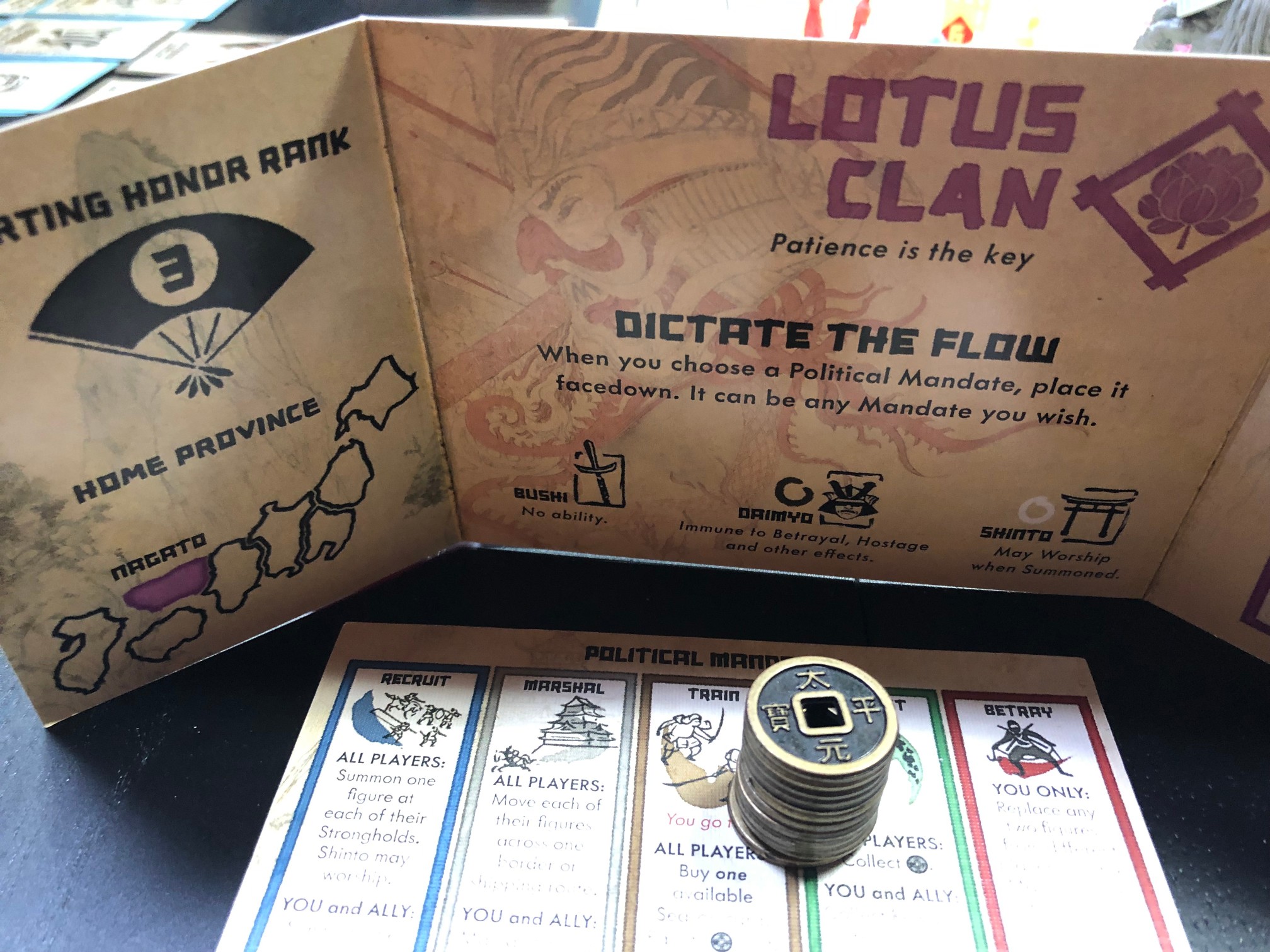 The winner of the battle then splits all their spent coins to all the losers in war reparations. This mechanic ensures you likely will not go a season losing everything, as you grow richer as you lose, and can then use those coins in future battles. Finally, after all the battles are spent, Shinto at shrines come home, all coins and Ronin are discarded, and a new season starts.
The winner of the battle then splits all their spent coins to all the losers in war reparations. This mechanic ensures you likely will not go a season losing everything, as you grow richer as you lose, and can then use those coins in future battles. Finally, after all the battles are spent, Shinto at shrines come home, all coins and Ronin are discarded, and a new season starts.
The Clans
I would be amiss without mentioning the clans, as each clan plays very differently and has their own strategies and nuances.
First up in the clans you can choose from is the Koi clan, master of Ronin. This clan allows you to swap all of your earned Ronin at the start of the War Phase for coin, and then coins not spent after bidding are free Ronin. This makes them a formidable foe, and one you really don't want to rely on beating in straight-out war.
Next come the wily Dragonfly clan, who when recruiting can place units anywhere on the board, and when moving have no distance restrictions. One of the more difficult clans for newcomers to play against, Dragonfly players can dominate a game simply by snatching ignored provinces late, or by doing a late marshal to shift the war balance of the entire map in one fell swoop.
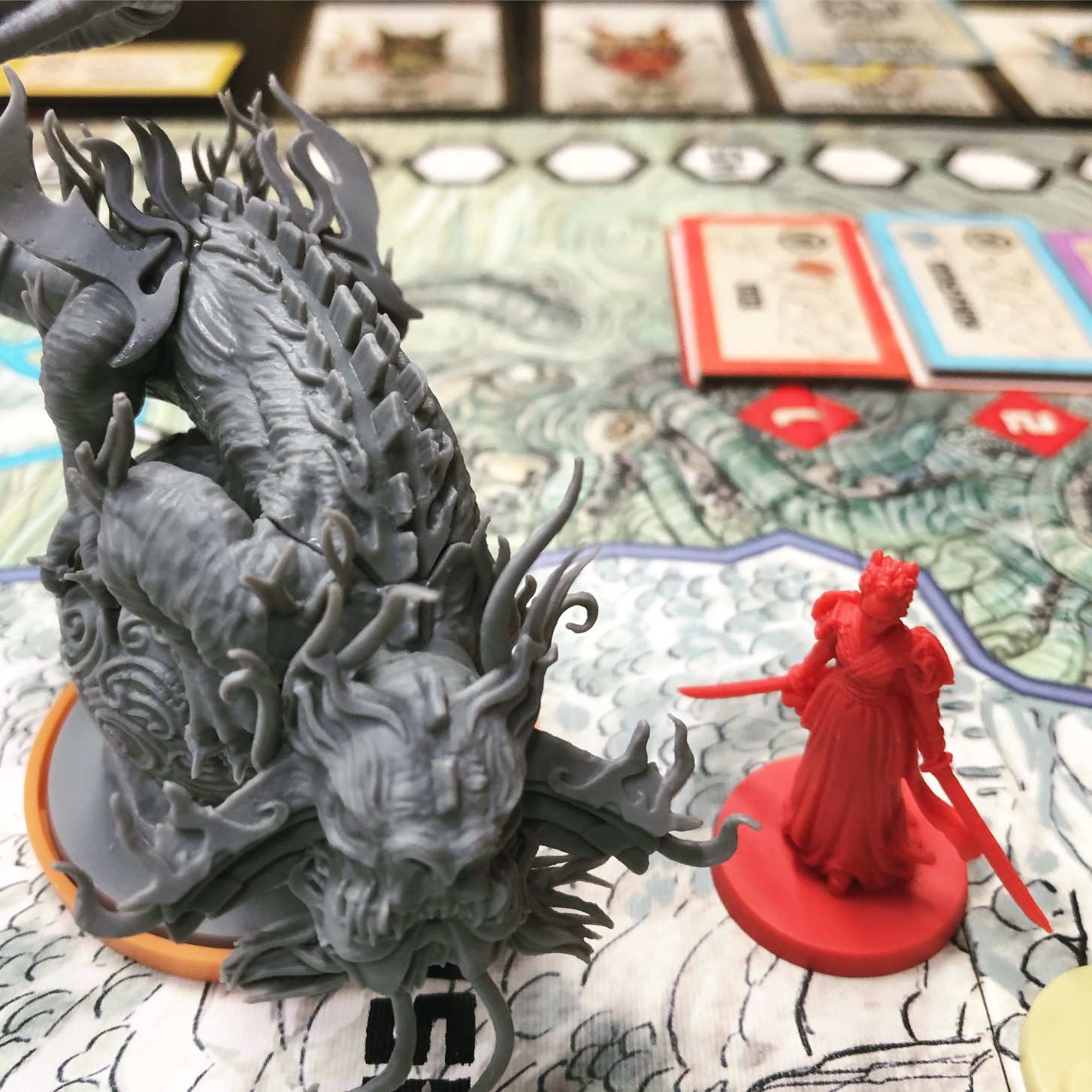
Bonsai, when training, get to purchase anything for a maximum of one coin - this inevitably means they'll be going after the powerful cards and expensive monsters, which can make them a threat if they get the right combos. Beware their ability to score high on the late-game Winter cards, which give points based on various resources. Bonsai can feel weak at the start, as they don't have the movement or strength bonuses as other clans, but if played right they are a serious VP threat.
Next up is the Lotus clan, the most indirect of the clans. They get no in-game benefit except one: when picking a mandate, they do not place it face up (instead hiding what they chose for no one else to see), and instead place it face-down and pick whatever mandate action they want the table to take. This means they can control the entire flow of the game to their liking; if they want it to be train-heavy, or lots of movement, then it shall be so. They can also simply neuter other clans power-moves by burying cards others want: many a clan hoping for a late-game marshal saw their plans wither with a cunning Lotus clan stealing that chance away. I will say Lotus can be the hardest clan for a new player, as the strategy for this clan must be long-term rather than short, and mistakes here are costly and leave them in weak position.
The Kickstarter version of Rising Sun also contains an additional faction, the Fox Clan. Wildly speculative BGG'ers have debated their relative strength, but I have found them fairly balanced and an interesting foil to the Dragonfly clan. At the start of the War phase, they can place a Bushi (a normal unit) on every province they have no units on - thereby ensuring they can be in whatever battle they want. Usually down on the honor track for most of the game, a smart Fox player can be judiciously wise in the battles they face, and move up quickly on the points track by picking and choosing only strategically-important battles. Beware this clan in the hands of the experienced.
There are two more clans in the Dynasty expansion (along with a ton more monsters and cards in other expansions), but I've opted to leave them out of this review. My hot take on them is the Sun clan is good in large games but hard to play, and the Moon clan at first glance seems like nothing, but after play is a devastating force.
Thoughts
I could probably spend another 4,000 words on this game, going over the card intricacies, different monsters, season card variants, expansions, and gameplay nuances. It seems that deep. There is simply so much to this game in terms of replay value, depth, table dynamics, and more.
However.
I really like Rising Sun. I do. I'll play it every time it comes to the table. I'll relish in my failed attempts as Lotus to be the gamemaster of the mandates. I'll delight in putting 5 monsters into one death-island province then scattering them to the wind in a single marshal to wreak devastation on the countryside. I'll dream about how I would paint the miniatures if I owned them. I have a great time even when losing this game badly, a metric I consider to be a clear indicator of a good game.
However.
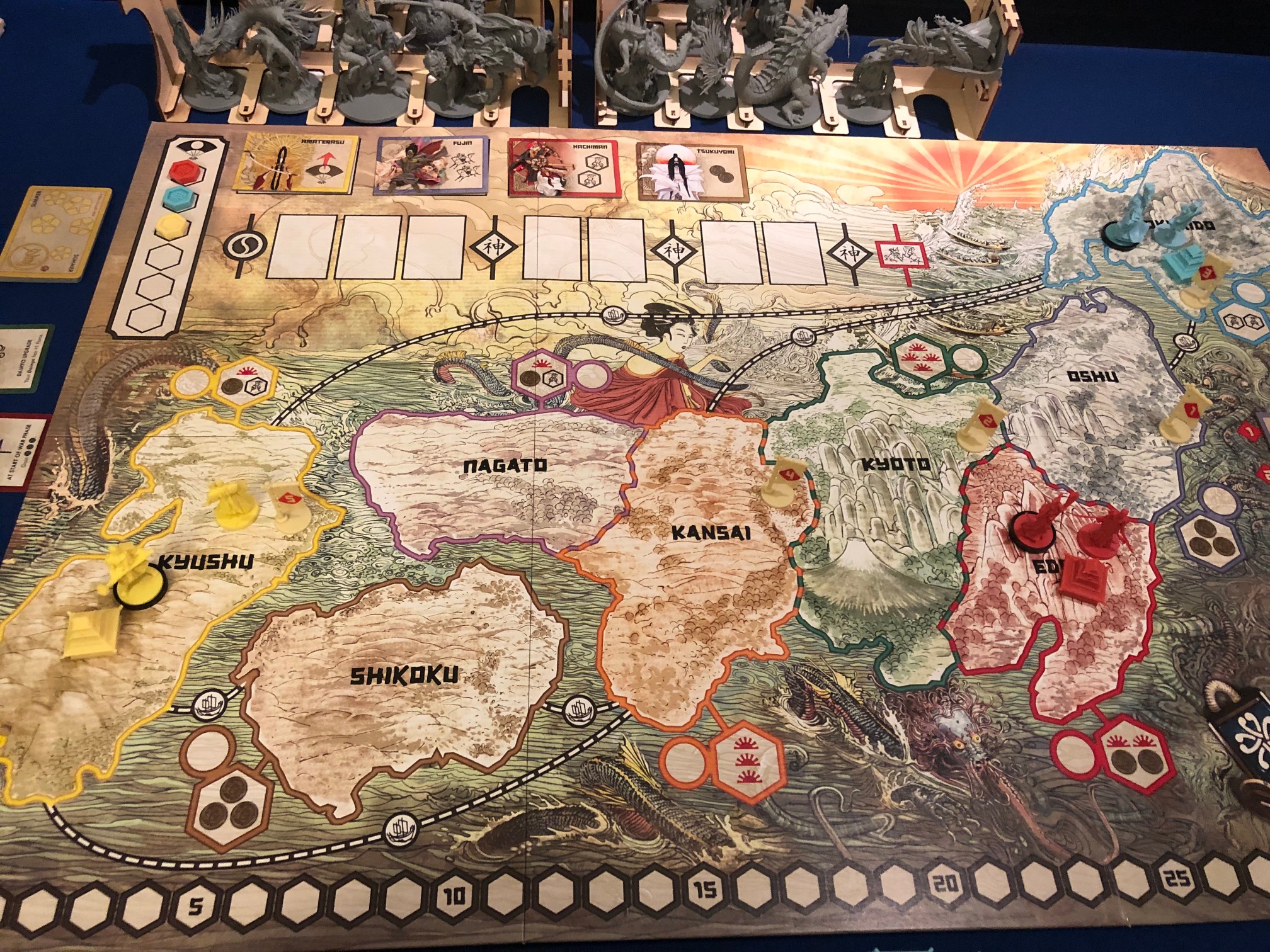 After my plays of this, I just don't find an itch to come back to this a lot. It's more like a once-or-twice-every-6-months-game. It's not like Root, whose uncanny depths I want to explore and rich table dynamics I love, or Kemet, the perfect mid-size area control game with tight gameplay. It doesn't have the cohesive theme and story that Scythe screams, except for "Hey we're in feudal Japan now and there's monsters!". Rising Sun is a good game. It's a fun game. There's nuance and depth and interesting gameplay mechanics that I like. But it's not a top tier game to me.
After my plays of this, I just don't find an itch to come back to this a lot. It's more like a once-or-twice-every-6-months-game. It's not like Root, whose uncanny depths I want to explore and rich table dynamics I love, or Kemet, the perfect mid-size area control game with tight gameplay. It doesn't have the cohesive theme and story that Scythe screams, except for "Hey we're in feudal Japan now and there's monsters!". Rising Sun is a good game. It's a fun game. There's nuance and depth and interesting gameplay mechanics that I like. But it's not a top tier game to me.
It just misses that clear cohesion to all its components that truly great games have. Individually each part of the game is great. But together? The minis in Rising Sun feel added on for wow effect. The cards are random, and winter cards force gameplay toward certain mechanics. The cost for this game is very steep. Wins aren't really close - often there is a runaway winner mid-to-late game, and if you fall behind too early it's impossible to catch up. General gameplay, no matter how different each clan is, still feels mostly the same for every table I get this on. I really want to give Rising Sun a higher score. It's a fantastic game. But something - maybe like some of the deep, mass-marketed video games of late - feels like it's missing something. That unifying bond, that world-bending line between the yin and the yang - it doesn't have it.
So. If you want a game that has interesting mechanics, beautiful minis, you're okay with a high cost, and surprising moments throughout? Rising Sun will fit that for you every time. You'll enjoy it. You'll want to play it. But after a while, it won't wow you. It won't draw you in like a sailor's siren. You'll come back to it from time to time and remember why you left it. If you're still okay with that? Go for it. Just beware the Foxes.
Pros
* Deep, rich strategic gameplay
* Simply beautiful art and minis
* Sly negotiation and shifting alliance elements create dynamic games
* Excellent class combinations
Cons
* Individual parts are strong, yet lacks clear cohesion
* Very prone to analysis paralysis
* Expensive
* Punishing for new players; runaway victories are common
* Winter cards can force games to narrow strategies
amazing
Board game reviews and news from Austin, Texas. We provide no-nonsense reviews about all kinds of games. With flair.

